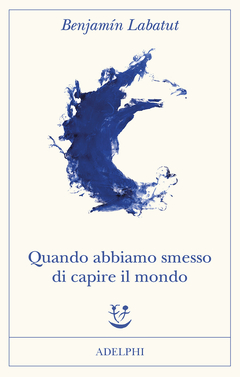Quarterly Book Review - When We Cease to Understand the World
Dear readers: life has been busier than ever. My hobbies have escalated dramatically and I’ve taken up projects such as rewiring the basement, fabricating my own pieces of furniture and changing the head gasket on my car. Of course, time and energy are not infinite and I had to reduce my efforts in other areas of interest, like playing with old computers and, thus, writing articles for this blog.
Recently, however, someone I hold very dear has lent me a book that’s been refreshing enough for me to pick up the keyboard once again (so I doubly thank you). This quarter’s book is: When We Cease to Understand the World by Benjamín Labatut.

I read the excellent Italian translation by Lisa Topi published by Adelphi. The cover art is Barbara by Yves Klein: an excellent choice that, in my opinion, works very well as a visual introduction to the first chapter of the book.
The Book
A rather recent publication, When We Cease to Understand the World is a somewhat dark but incredibly lucid take on the incredible and very rapid discoveries the world’s most brilliant scientists made at the beginning of the XX century.
The book touches the subjects of chemistry, mathematics and physics and is a collection of short historical novels that portray the subjects, the authors of each discovery, in their “natural habitat”. The book is crude and visceral at times, and Labatut’s writing is able to draw the reader inside the scenes that the various protagonists find themselves in, which are often but a reflection of the effect that their discoveries have on their already fragile egos and psyches.
In this brief foray into the mind and private life of the subjects, the author uncovers the contradictions that surround the discovery of the very foundations of modern science: how the man who invented Cyanide was also responsible for perfecting the process of extracting Nitrogen, how the discovery of the singularity consumed the mind and body of its author, how the mathematicians who tried to uncover the secrets of mathematics were so burned by what they found that it changed their life completely (and often self-destructively), and how the discovery of quantum mechanics cost essentially every physicist who was involved with it a significant portion of their sanity.
The most interesting take for me is the fact that all of these were framed, perhaps not surprisingly, in a time of tumultuous war that ravaged Europe and brought a disruption to the equilibrium of the Old World similar in proportion to how quantum physics completely changed the way we think about reality.
When We Cease to Understand the World brilliantly conveys the struggles that some of the finest minds to have ever set foot on this Earth had with society and life in general, and their inability to separate themselves from the harsh reality of their, often shocking and revolutionary, discoveries. This self-proclaimed work of “semi-fiction” is, in my opinion, a must read for anyone who is either interested or involved in STEM (even at large) primarly because it forces the reader to face the fact that equilibriums in both nature, psyche, and society are so fragile that they may be completely overthrown in an instant.
Do I recommend this Book?
Yes; but be careful about the mix of fact and fiction. I found it somewhat similar to Inglorious Bastards in this department, with one notable exception: while many of the facts are romanticized, the protagonists are real, historically relevant people (I purposefully omitted their names in this review). This may ring a warning bell but, if you’re ready to be deceived, it’s one hell of a ride.
If you’re undecided, I encourage you to read through reviews on Goodreads, as I’ve found some of them very on point and they might give you (or take back!) some more confidence.
